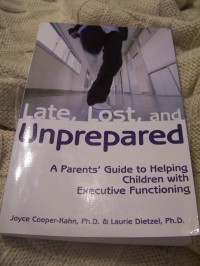Fashionable Media Review Policy: The featured product for this review was provided to me, at no cost, by the manufacturer or representing PR agency for the sole purpose of product testing. Opinions expressed are my own and are not influenced by monetary compensation.
Initially, I had a hard time getting through this book, Late, Lost and Unprepared– A Parent’s Guide to Helping Children with Executive Functioning. I found it a bit overwhelming and definitely a book that made me think. I believe that’s why I put off reading it for so long. Each time I picked it up, there was so much to think about and consider – Remember, I have seven children to evaluate as I read and thought through all of the information contained within this book!
The material was interesting as the authors discussed executive function. Here is the formal definition of executive functioning:
The executive functions are a set of processes that all have to do with managing oneself and one’s resources in order to achieve a goal. It is an umbrella term for the neurologically-based skills involving mental control and self-regulations. Page 10.
The basics of executive functions are:
~ The executive functions all serve a “command and control” function: they can be viewed as the ‘conductor’ of all cognitive skills.
~ Executive functions help you manage life tasks of all types. For example, executive functions let you organize a trip, a research project, or a paper for school.
~ Often, when we think of problems with executive functioning, we think of disorganization. However, organization is only one of these important skills. Page 9.
Once I got into the book, I found it very helpful in assessing why a particular child may be the way he/she is and that gave me relief to know that it wasn’t just a discipline issue. It was more like a re-training or learning issue and the way the child processes things in their brain.
This book isn’t alot of pyscho-babble. It is down to earth and straight forward. The authors, Joyce-Cooper-Kahn, Ph.D and Laurie Dietzel, Ph.D have done a very good job of presenting the information they’ve gathered in a simple format with busy parents in mind.
While I did not agree with everything the authors said or recommended, I do think they seemed to have a good understanding of parenthood and the affects of executive weakness as it relates to relationships, school and family life. The second half of the book dealt with practical suggestions on how to help your child who is suffering from executive weakness and that was very helpful.
I found that I was put off by the term executive weakness being labeled as a “disability”, but perhaps that’s just me being overly sensitive. Overall though, I think the book gives parents a better understanding into their child, who may be struggling with turning their homework in late, forgetting things, saying things without thinking, or keeping their room organized.
A couple of my favorite quotes:
And of course, you need to keep the golden rule of raising siblings in mind. That is, fair does not mean equal or the same treatment for all. Being fair means offering to each child what she or he needs.
Remember that the origins of the word discipline come from the Latin word that means ‘to teach’ While thoughtful punishments certainly have a role in raising children, they are useless if the child does not know and have the ability to perform the desired behavior.
Good tips to remember as we parent our children.

Thank you, thank you, thank you. This is exactly the book I need to read. I am already happy to know a book like this exists and that fair does not mean equal or the same treatment for all. A must read for any parent with more than 1 child.
Glad you think it will be of help to parents and to you!
Awesome article! thanks for this great article.